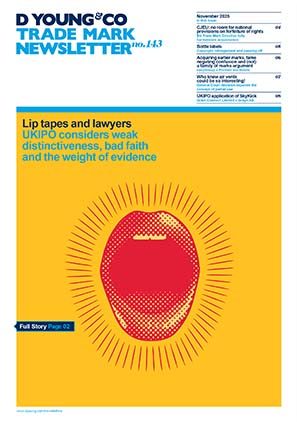Grand Board dismisses Gleissner appeal: cancellation proceedings an abuse of process
Fashion TV filed revocation proceedings against a European Trade Mark (EUTM) owned by a Peek & Cloppenburg company on the grounds of non-use.
Peek & Cloppenburg claimed that the revocation action was an abuse of process, since:
- Fashion TV is linked with the well-known trade mark “troll”, Michael Gleissner;
- It filed revocation actions against 36 other Peek & Cloppenburg marks within a short space of time;
- In 2014, a company related to Fashion TV had tried unsuccessfully to purchase two of the marks now under attack, with Gleissner himself handling negotiations;
- Fashion TV said it would withdraw all revocation actions if the two marks it had tried to purchase were assigned to it;
- The company had been founded only a couple of days before the revocation action was filed and has a “virtual” letterbox address. It does not appear to trade and seems to have been established solely for filing the cancellation actions;
- Companies connected with Gleissner previously filed 68 cancellation actions against Apple trade marks which in 2017 the UKIPO had held to be an abuse of process;
- Companies linked with Gleissner had also filed a number of applications corresponding to Peek & Cloppenburg marks.
Fashion TV did not respond to the abuse of process claims, and the Cancellation Division rejected the request for revocation on the basis that it had tried to use the proceedings for abusive ends unrelated to the public interest underlying non-use cancellation provisions. In most of the cases filed, the marks under attack were visibly present on the market.
Fashion TV appealed, claiming that it had a legitimate interest in revoking marks that have not been used without having to show any particular interest in doing so. Given the importance of the legal issues raised, the case was transferred to the Grand Board of Appeal.
The Grand Board of Appeal invited Fashion TV to respond to the factual claims made by Peek & Cloppenburg regarding the approach to purchase certain marks and the numbers of cancellation actions filed. It responded claiming that the link between itself and Gleissner had not been proven, and that such claims were a conspiracy theory.
The Grand Board of Appeal reviewed all evidence of Gleissner’s previous activities. It noted that substantial evidence of use of the attacked mark had been filed, albeit not assessed. Claims that unused marks should be cancelled as a matter of public interest therefore lost part of their relevance since this was not a mark that had not been used at all.
The Grand Board of Appeal was satisfied that Gleissner had been behind the approach to Peek & Cloppenburg to buy the two marks noted. It also held that evidence of his prior activities showed there was a particular pattern to his activities and that there was general concern in the trade mark world about these.
The quantity of cases brought was “excessive”; they had been commenced with “an improper and illegitimate ulterior purpose” and their aims and effects were “disruptive”. The costs and logistical challenges involved in defending such attacks at the same time were also excessive.
The Grand Board of Appeal held that that was abusive, particularly since it seemed to be a retaliatory measure in response to Fashion TV’s failure to purchase the two earlier marks from Peek & Cloppenburg. The Grand Board of Appeal agreed with the Cancellation Division’s reliance on the Kratzer judgment of 28 July 2016 (Case No. C-423/15) which confirmed that EU law cannot be relied upon for abusive or fraudulent ends.
The “artificial nature” of the company behind the attacks was noted, and also that this conveyed certain procedural advantages (for example, no real risk of costs awards; avoiding costs of having a representative by using a “virtual” address in the jurisdiction). The number of other trade mark applications (2,500), company names (1,100) and domain names (5,300) identified as being linked with Gleissner was also relevant.
The public interest in revoking unused marks is not absolute. Whilst it is in the public interest to cancel a non-used trade mark, flooding other parties/offices with vexatious requests is not.
The Grand Board of Appeal agreed that there seemed to be no reasoning, not even an altruistic or “Robin Hood” purpose, behind Gleissner’s actions over the years.
In short
Applying the objective and subjective criteria required by prior EU jurisprudence (in particular the Kratzer judgment), the Grand Board of Appeal held that the Cancellation Division had been correct to find that a revocation request must be rejected if it is abusive; and that the objective and subjective criteria for such abuse as laid down in CJEU case law had been fulfilled in the present case. The appeal was dismissed.
Case details at a glance
Jurisdiction: European Union
Decision level: Grand Board of Appeal
Parties: Fashion TV Brand Holdings CV v CBM Creative Brands Marken GmbH
Date: 11 February 2020
Citation: R 2445/2017-G

